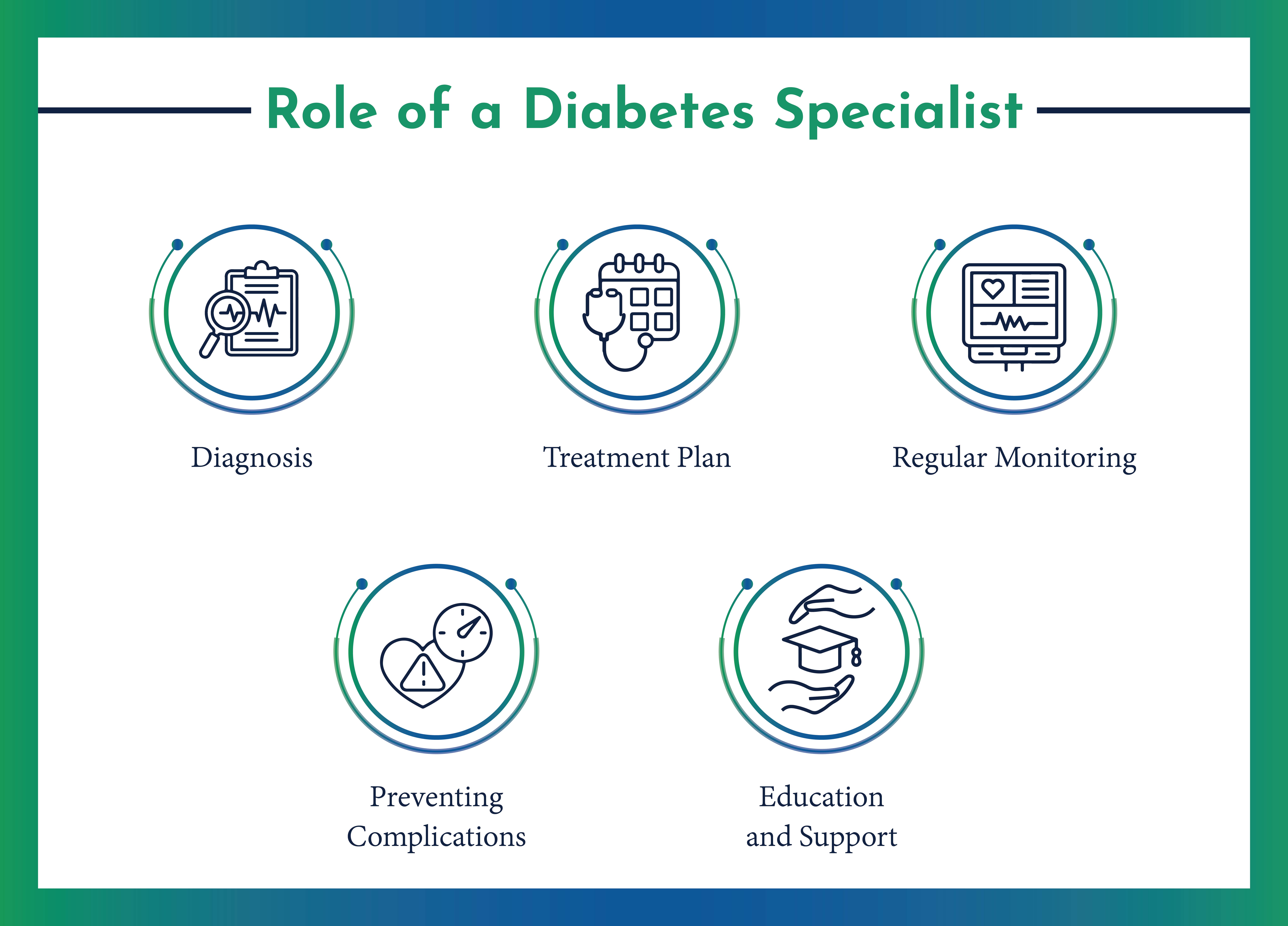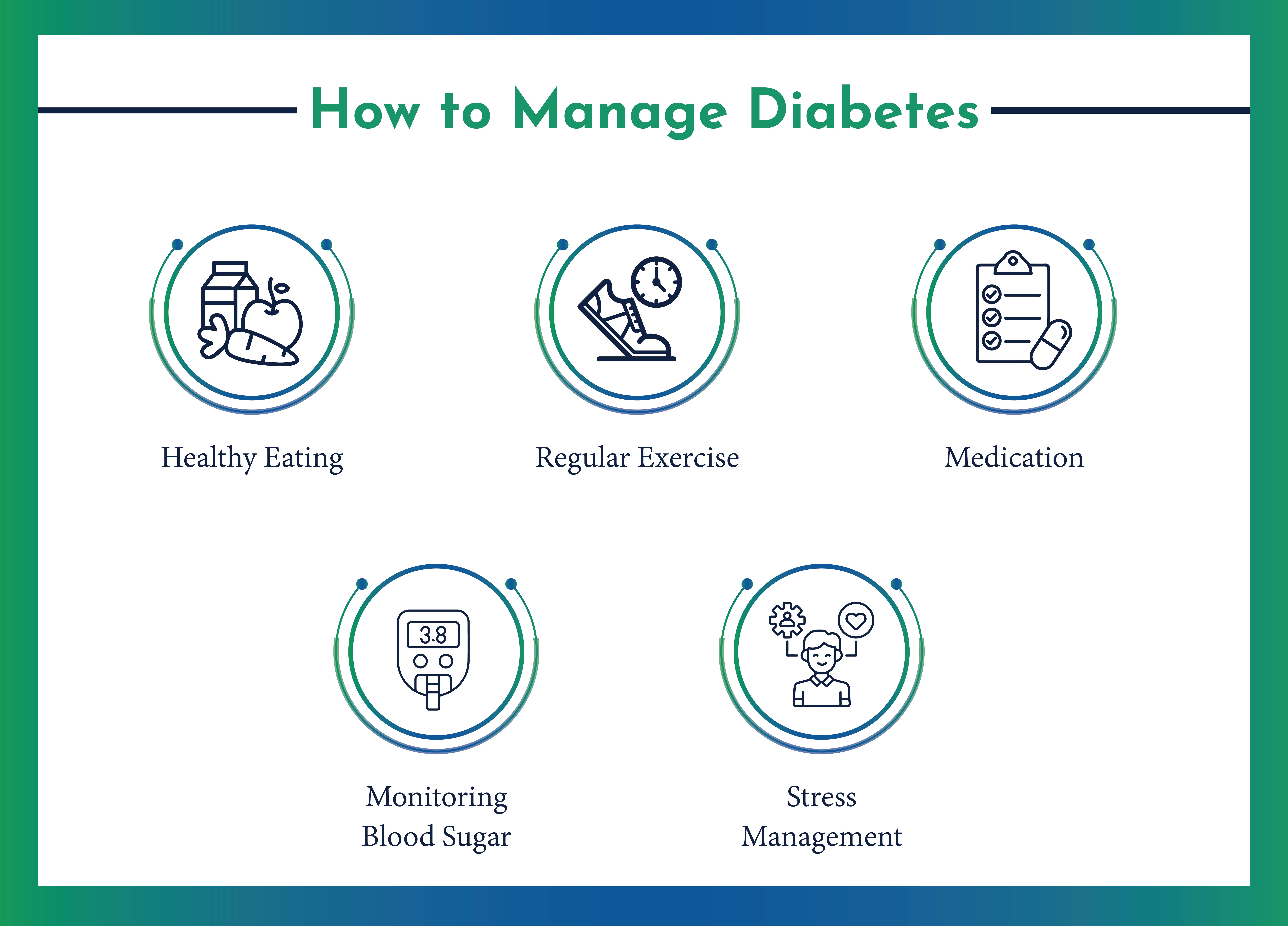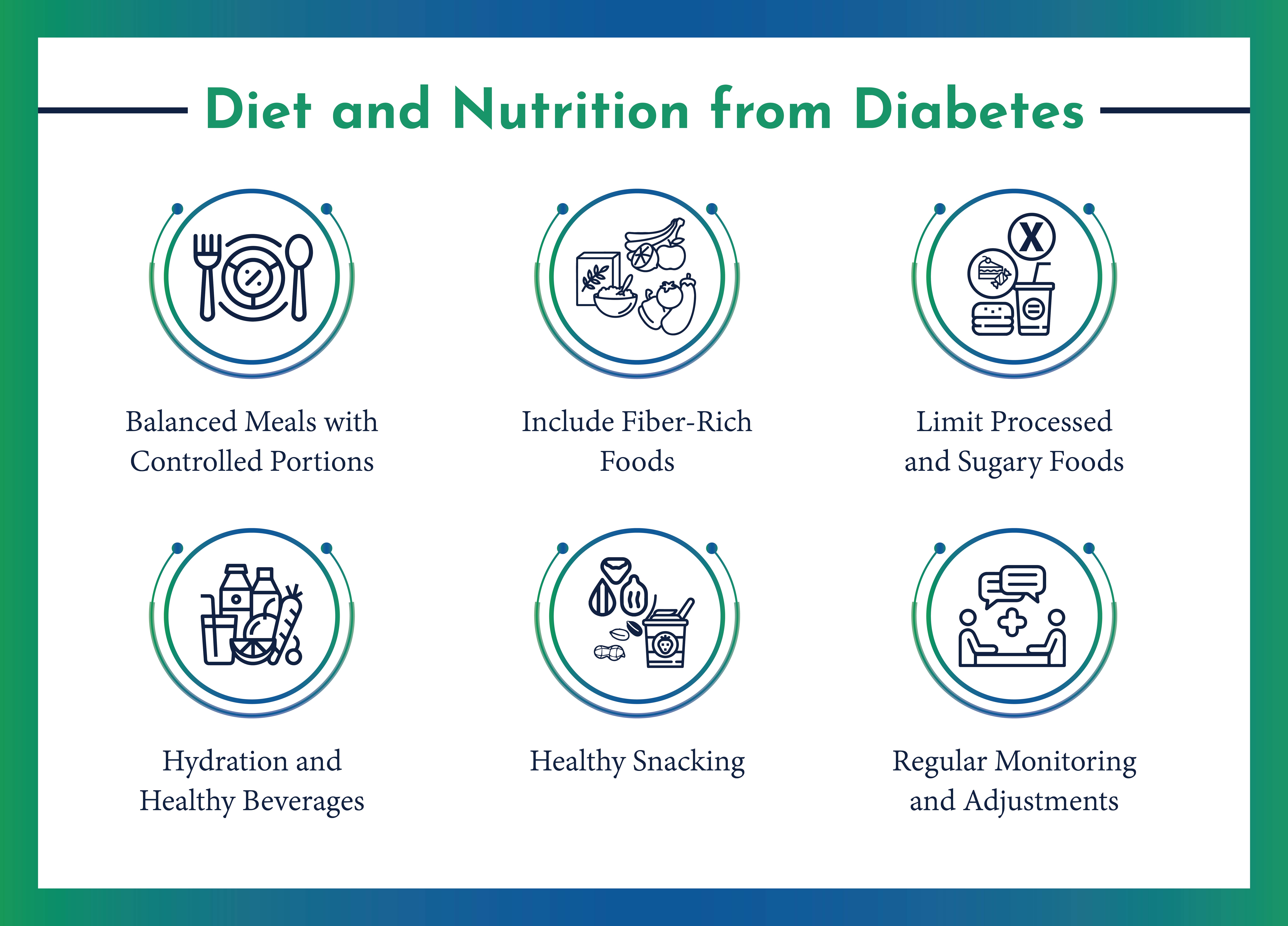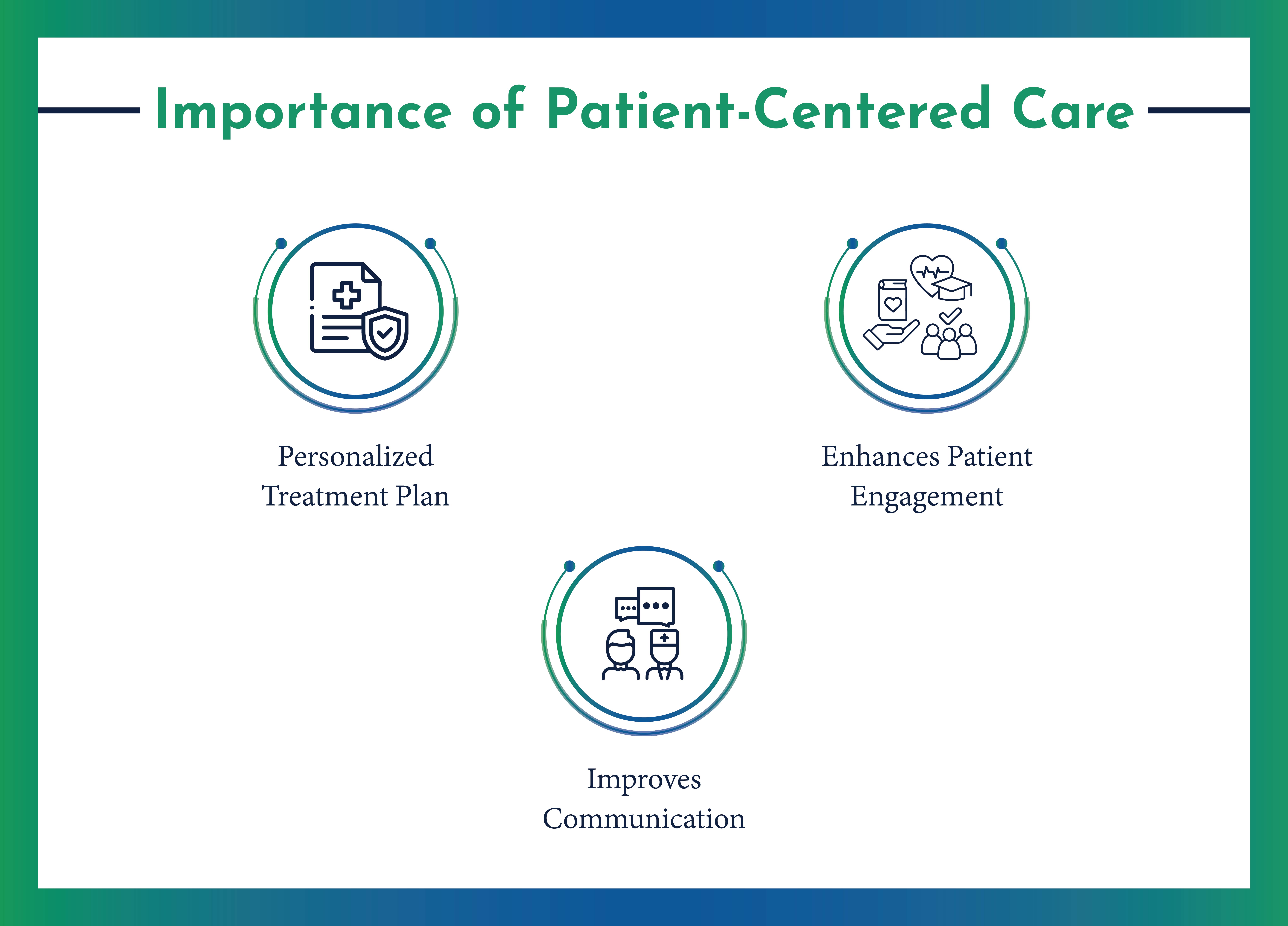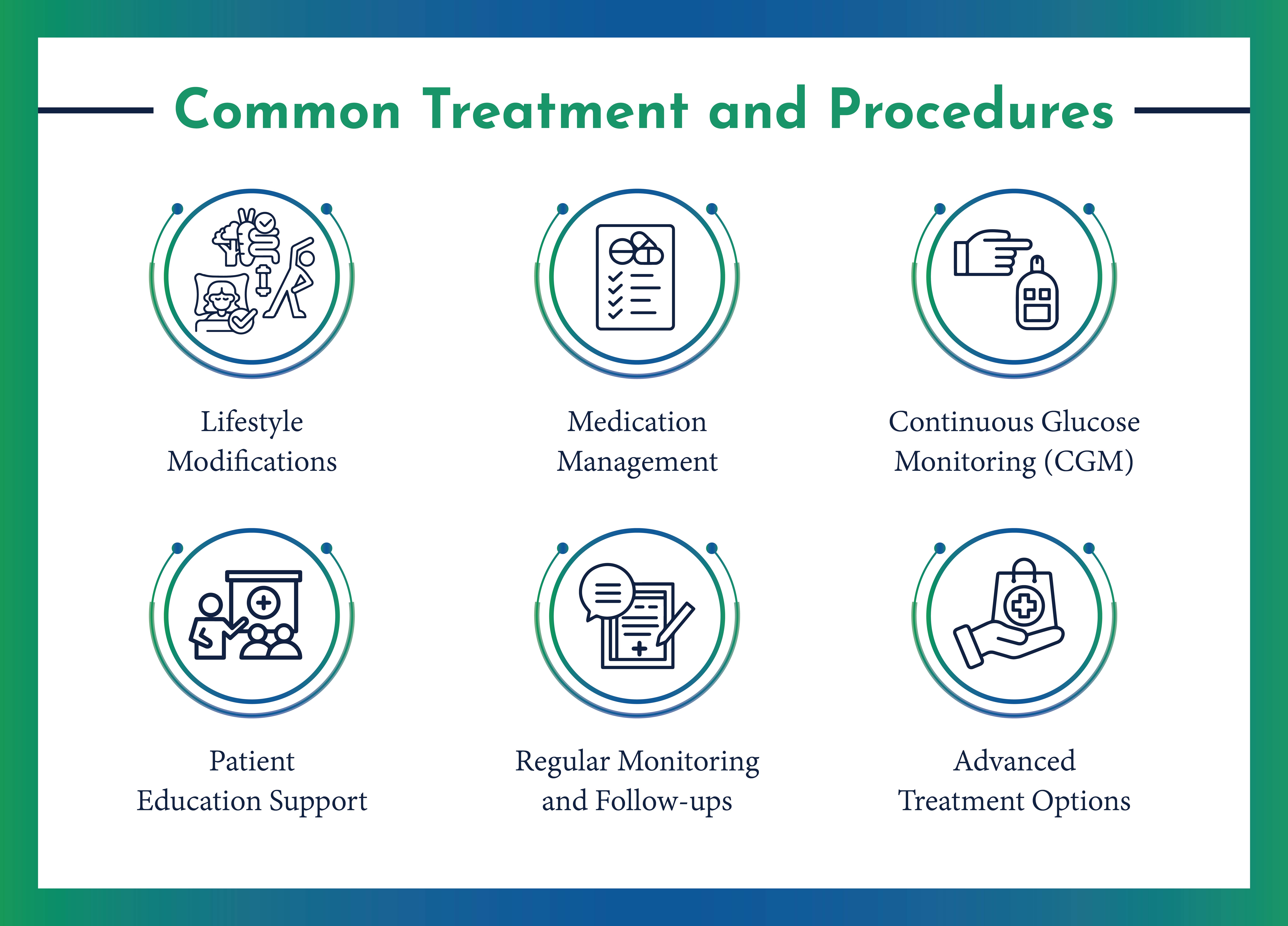Explanation of the Role of a Diabetes Specialist:
A diabetes specialist, also known as an endocrinologist, is a healthcare professional who specialize in diagnosing and treating hormonal disorder, including diabetes. In Dehradun, where diabetes is a growing concern Dr. Shreya Sharma plays a vital role in helping individuals manage their conditions effectively.
-
-
Diagnosis:
Specialist begin with a thorough medical history and physical examination, focusing on symptoms like fatigue, weight changes, temperature sensitivity, and mood fluctuations. They order blood tests to measure levels of thyroid hormones (T3,T4) and thyroid stimulating hormone (TSH) to diagnose conditions such as hypothyroidism, hyperthyroidism, goiter (enlargement of the thyroid), and thyroid nodules (lump in thyroid). This involves physical exams, blood test to check hormone levels and imaging test like ultrasounds.
-
Treatment:
Prescribing hormone replacement (like levothyroxine for hypothyroidism) or antithyroid medication. Radioactive iodine sometimes used to treat hyperthyroidism by shrinking the thyroid gland. In some cases, especially for large goiters or cancer, surgical removal of part or all of the thyroid may be necessary.
-
-
Regular Monitoring:
Diabetes specialist closely monitor patient’s blood sugar levels to ensure their treatment is effective. This may involve frequent blood test, continuous glucose monitoring (CGM), or home blood sugar testing.
-
Preventing Complications:
Diabetes specialist are proactive in preventing complications associated with diabetes. This includes screening for conditions such as heart disease, stroke, kidney disease, and nerve damage.
-
Education and Support:
They provide patients with education and support to help them understand their condition and manage it effectively. This may involve counseling, group therapy, or referrals to other healthcare professional.
The Importance of Managing Diabetes:
-
Preventing Complications:
Poorly managed diabetes can lead to a host of complications,
including:
- Heart Disease and Stroke: High blood sugar can damage blood vessels and increase the risk of heart attack and stroke.
- Kidney Disease: Diabetes can damage the kidneys, leading to kidney failure.
- Nerve Damage: High blood sugar can damage nerves, causing numbness, tingling, and
pain in hands, feet, and other parts of the body.
- Eye Problem: Diabetes can lead to vision problems, including cataracts, glaucoma, and
diabetic retinopathy.
-
Improving Quality of life: Managing diabetes can significantly improve your quality of life. When your blood sugar is well-controlled, you’re less likely to experience symptoms like fatigue, thirst, frequent urination, and blurred vision.
-
Increasing Lifespan:
People with diabetes who manage their condition effectively can live longer
and healthier lives.
How to Manage Diabetes:
Managing diabetes involves a combination of lifestyle changes and medical treatment:
-
Healthy Eating:
A balanced diet can help regulate your blood sugar level. Focus on eating plenty
of fruits, vegetables, whole grains, and lean protein.
-
Regular Exercise:
Physical activity helps improve insulin sensitivity and can lower blood sugar
levels. Aim for at least 30 minutes of moderate-intensity
-
Medication:
Many people with diabetes require medication to manage their blood sugar levels.
This may include insulin injections or oral medications.
-
Monitoring Blood Sugar:
Regularly monitoring your blood sugar levels is essential for effective diabetes management. This will help you understand how your diet, exercise, and medications are affecting your blood sugar.
-
Stress Management:
Stress can affect blood sugar levels. Effective stress management techniques, such as relaxation exercises or meditation, can help.
Question to Ask During First Consultation:
-
What type of diabetes do I have, and what caused it?
-
How severe is my condition?
-
What are my blood sugar targets?
-
How will diabetes affect my overall health in the long term?
-
How often should I check my blood sugar, and how do I do it properly?
-
What should I do if my blood sugar levels are too high or too low?
-
Will I need to take medication or insulin, and how should it be administered?
-
What are the side-effects of the medication I’ll be taking?
-
Are there any alternative treatment or therapies to manage diabetes?
-
What changes should I make to my diet, and can I see a nutritionist?
-
What kind of physical activity should I be doing, and how much is too much?
-
How will stress, sleep, and other lifestyle factors affect my diabetes?
-
How can I prevent complications and what tests should I undergo regularly?
-
What symptoms should I watch out for, and when should I seek immediate help?
-
How often should I have follow-up appointments?
Diet and Nutrition from Diabetes Specialist
When it comes to managing diabetes, diet and nutrition play a critical role in maintaining balanced blood sugar and overall health. For those in Dehradun, seeking expert advice from a specialist like Dr.Shreya Sharma widely regarded as the best endocrinologist in Dehradun.
-
Balanced Meals with Controlled Portions:
A key aspect of managing diabetes is controlling portions sizes to prevent blood sugar spikes. Dr. Shreya Sharma recommends focusing on balanced meal that includes carbohydrates, protein, and healthy fats. Portion control helps in managing weight and keeps blood sugar levels stable throughout the day.
-
Include Fiber-Rich Foods:
Fiber helps slow down the absorption of sugar, which is beneficial for people with diabetes. Foods like oats, whole grains, vegetables, and fruits like apples and pears are rich in fiber. The importance of fiber helps in controlling blood sugar and improving digestive health.
-
Limit Processed and Sugary Foods:
To effectively manage diabetes, reducing the intake of processed foods and sugars is critical. It is advisable to avoid sugary beverages, sweets, and refined carbohydrates as they can cause rapid blood sugar spikes.
-
Hydration and Healthy Beverages:
Staying hydrated is important, and water is the best option.
Dr. Shreya Sharma also recommends avoiding sugary drinks, sodas, and fruit juices, which can
lead to sudden spikes in glucose levels. Herbal teas and green tea are good alternatives for
people with diabetes.
-
Healthy Snacking:
For managing hunger and blood sugar between meals. Healthy snacks like nuts, seeds, and yogurt. These snacks provide essential nutrients and keep you feeling full longer, without causing large fluctuations in blood sugar levels.
-
Regular Monitoring and Adjustments:
Since each individual responds differently to certain foods, Dr. Shreya Sharma emphasizes regular blood sugar monitoring and adjusting dietary choices accordingly. Consulting with a diabetes specialist helps in fine-tuning your diet based on your body’s specific needs.
By following these dietary tips from Dr. Shreya Sharma, diabetes patients can take control of their health, minimize complications, and lead a healthier lifestyle. Dr. Sharma’s expertise as a leading endocrinologist in Dehradun ensures that her patients receive personalized, evidence- based care for optimal diabetes management.
Importance of Patient-Centered Care:
Patient-centered care in diabetes is essential because it focuses on the unique needs, preferences, and values of each individual patient. This approach is especially important in managing chronic conditions like diabetes, where treatment success relies heavily on lifestyle changes, medication adherence, and patient engagement.
-
-
Personalized Treatment Plan:
Diabetes affects people in different ways, and a one-size-fits-all treatment plan doesn’t work. Patient-centered care allows healthcare providers to tailor treatment plans based on each patient’s unique circumstances, such as their medical history, cultural background, socioeconomic status, and personal preferences. This leads to better management of the disease and improved outcomes.
-
Enhances Patient Engagement:
When patients are involved in their own care decisions, they are more likely to engage in their treatment. This includes adhering to medications, following dietary recommendations, and making necessary lifestyle changes. Active participation empowers patients to take control of their health, which is crucial in managing a lifelong condition like diabetes.
-
Improves Communication:
Patient-centered care fosters open communication between healthcare providers and patients. This ensures that patients fully understand their condition, treatment options, and what is expected of them. Improved communication also helps build trust, making it easier for patients to express concerns and ask questions, ultimately leading to better health outcomes.
How to Choose the Best Diabetes Specialist in Dehradun
-
Look for a board-certified endocrinologist or diabetologist, as they specialize in diabetes care
and related conditions.
-
Check their experience, especially in treating diabetes patients. Specialists with a long history of managing diabetes will likely have encountered a wide range of cases, making them more adept at handling your specific need
-
Check online reviews and ratings on medical platforms like Practo or Lybrate to see what other patients say about their experience.
-
You should feel comfortable discussing your concerns with the specialist. They should be patient, good listeners, and provide clear explanations of your condition and treatment options from friends, family, or your primary care doctor.term?
-
Ensure that the doctor specializes not just in general medicine, but specifically in diabetes management.
-
The best specialists will create personalized treatment plans tailored to your lifestyle, health needs, and diabetes type.
-
They should emphasize a holistic approach, including advice on diet, exercise, medication, and monitoring.
-
Choose a specialist who is conveniently located, as diabetes requires regular monitoring and follow-up visits.
-
Consider the cost of consultations, tests, and treatments, and check if the specialist accepts your health insurance.
-
Diabetes is a chronic condition requiring long-term management. It's important to choose a specialist who is committed to your ongoing care, offers regular follow-ups, and adjusts your treatment plan as your condition evolves.
Common Treatment and Procedures:
-
Lifestyle Modifications:
A cornerstone of diabetes management is lifestyle modification. Dr.Shreya Sharma emphasizes the importance of a balanced diet and regular physical activity. Patients are encouraged to adopt a diet rich in whole grains, fruits, vegetables, and lean proteins while limiting sugars and refined carbohydrates. Regular exercise, such as walking, swimming, or yoga, can help improve insulin sensitivity and maintain healthy blood sugar levels.
-
Continuous Glucose Monitoring (CGM):
Is a revolutionary tool that provides real-time blood sugar readings throughout the day. Dr. Shreya Sharma utilizes CGM technology to help her patients track their glucose levels more accurately. This data allows for timely adjustments in diet, activity, and medications, helping patients maintain optimal glucose control.
-
Patient Education Support:
Education plays a vital role in diabetes management. Dr. Shreya Sharma conducts regular educational sessions to empower her patients with knowledge about their condition. Topics include understanding diabetes, recognizing symptoms of high or low blood sugar, and learning how to read food labels. Additionally she encourages patients to join support groups where they can share experience and strategies for managing their condition.
-
Regular Monitoring and Follow-ups:
Regular follow-ups appointments are essential for effective diabetes management. Dr. Sharma closely monitors her patient’s progress through routine blood test, including HbA1c levels, to assess long-term glucose control. She also evaluates for potential complications, such as neuropathy, nephropathy, and retinopathy, ensuring timely interventions when necessary.
-
Advanced Treatment Options:
For patients with complications from diabetes, Dr. Sharma may recommend advanced treatment options. This could include referrals to specialists for foot care, vision checks, or kidney function evaluations. Furthermore, she stays updated on the latest advancements in diabetes care, providing her patients access to cutting-edge therapies and clinical trials.
-
Dr. Shreya Sharma is widely recognized as the best endocrinologist in Dehradun, renowned for her expertise in diagnosing and treating a range of hormonal disorders. With a robust educational background and extensive clinical experience, she specializes in conditions such as diabetes, thyroid disorders, and hormonal imbalances. Dr. Sharma is dedicated to providing personalized care, focusing on holistic treatment plans that empower her patients to manage their health effectively. Her compassionate approach and commitment to patient education make her a trusted choice for individuals seeking expert endocrine care in the region.
